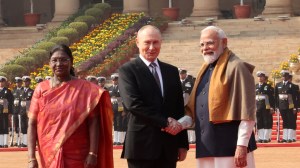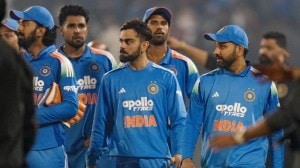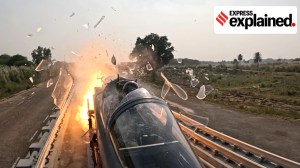
Knowledge Nugget: Taiwan
Subject: International Relations and Geography
Why in the news?
The U.S. State Department’s Taiwan page removed a previous statement about not supporting Taiwan’s independence last week. China on Monday (February 17th) urged the United States to “correct its mistakes” after the U.S. State Department removed previous wording on its website about not supporting Taiwan independence, which it said was part of a routine update, as per Reuters.
In another important development, China’s military on Monday also condemned the sailing of a Canadian warship in the Taiwan Strait, saying its air and naval forces had monitored and warned the ship.
Key Takeaways :
1. The U.S. State Department said it has made a routine update to the Taiwan section of its website, after the removal of previous wording saying it did not support Taiwan’s formal independence, among other changes that cheered the government in Taipei, as per Reuters.
2.The recently updated fact sheet on Taiwan retains Washington’s opposition to unilateral change from either Taiwan or from China, which claims the democratically governed island as its own.
3. Notably, the fact sheet removes the phrase “we do not support Taiwan independence” and includes a reference to Taiwan’s collaboration with a Pentagon technology and semiconductor development project and says the U.S. will support Taiwan’s membership in international organisations “where applicable”.
Story continues below this ad
4. The United States has no formal diplomatic ties with Taiwan but is its strongest international backer, bound by law to provide the island with the means to defend itself, quoted Reuters in its report.
 India also subscribes to the One China Policy, but it has an office in Taipei for diplomatic functions.
India also subscribes to the One China Policy, but it has an office in Taipei for diplomatic functions.
5.“The United States remains committed to its one China policy,” a State Department spokesperson said, referring to Washington’s officially taking no position on Taiwan’s sovereignty and only acknowledging China’s position on the subject.
 Taiwan is also located close to the South China Sea, a region where many east Asian countries have contested claims.
Taiwan is also located close to the South China Sea, a region where many east Asian countries have contested claims.
Notable Geographical Aspects of Taiwan
1. Taiwan, officially the Republic of China (RoC), is situated in the western Pacific Ocean and is separated from mainland China by the Taiwan Strait. It occupies an area of approximately 36,000 square kilometers. Taiwan is neighbored by Japan to the northeast, the Philippines to the south, and mainland China to the west.
Story continues below this ad
2. The East China Sea lies to the north of the island, the Philippine Sea to the east, the Luzon Strait directly to the south, and the South China Sea to the southwest.
3. Climate: Taiwan has a subtropical climate in the north and a tropical climate in the south. Summers are hot and humid, while winters are generally mild, but can be cooler in mountainous areas.
4. Taiwan is prone to earthquakes as it lies along the Pacific “Ring of Fire” — where 90% of the world’s earthquakes take place. The island and its surrounding waters have registered about 2,000 earthquakes with a magnitude of 4.0 or greater since 1980, and more than 100 earthquakes with a magnitude above 5.5, according to the USGS, a report by The Associated Press said.

History of Taiwan
1. Taiwan has been inhabited by indigenous peoples for thousands of years. It was briefly controlled by the Dutch and Spanish in the 1600s. In 1684, the Qing dynasty incorporated Taiwan as part of Fujian province and later declared it a separate Chinese province in 1885.
2. Following the Qing’s defeat in a war with Japan, it became a Japanese colony in 1895. In 1945, it was handed over to the Republic of China government at the end of World War Two.
3. In 1949 after being defeated by Mao Zedong’s communist forces, the Republic of China government fled and moved its capital to Taiwan, and Republic of China remains the island’s formal name.
4. Mao set up the People’s Republic of China, and claimed it was the only legitimate Chinese government for the whole of China, including Taiwan, as the Republic of China’s successor state.
Story continues below this ad
5. For decades, the Republic of China (ROC) based in Taipei claimed to be the legitimate government of China. However, in 1971, it was expelled from the United Nations in favor of the Beijing government.
6. However, Taiwan is a region where the people elect their own leaders, and it has a defined territory governed by its own military, passport, and currency. As a result, Taiwan functions with de facto independence, even though most countries do not formally recognize it as such.
7. The government of Taiwan asserts that the Republic of China is a sovereign state and argues that Beijing does not have the authority to represent or speak for Taiwan. This is because the People’s Republic of China has no involvement in how Taiwan chooses its leaders and has never governed the island.
8. Currently, only 12 countries maintain formal diplomatic ties with Taipei, most of which are small and developing nations. Most major Western countries, along with U.S. allies, maintain close unofficial relations with Taiwan by recognizing its passport and having de facto embassies in each other’s capitals. Taiwanese citizens can travel freely to most countries using their passport.
Story continues below this ad
BEYOND THE NUGGET: India’s relations with Taiwan
1. India does not have formal diplomatic ties with Taiwan yet, as it follows the One-China policy.
2. While following the One-China policy, India has an office in Taipei for diplomatic functions — India-Taipei Association (ITA) is headed by a senior diplomat. Taiwan has the Taipei Economic and Cultural Center (TECC) in New Delhi. Both were established in 1995.
(For reference: US says website update routine, after removal of reference to Taiwan independence, What is ‘Taiwan independence’ and is Taiwan already independent?, Taiwan: What is the Ring of Fire?, China condemns sailing of Canadian warship in Taiwan Strait, India’s One-China stand and relations with Taiwan)
Subscribe to our UPSC newsletter and stay updated with the news cues from the past week.
Story continues below this ad
Stay updated with the latest UPSC articles by joining our Telegram channel – Indian Express UPSC Hub, and follow us on Instagram and X.

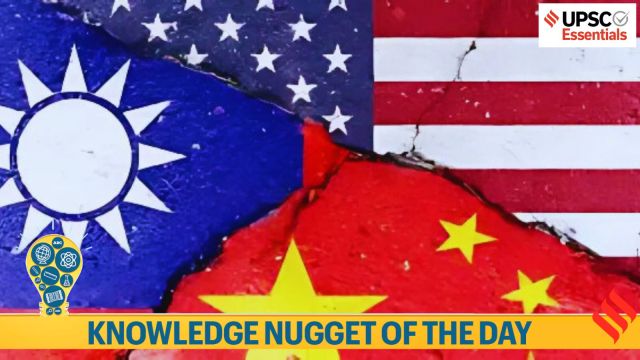

 India also subscribes to the One China Policy, but it has an office in Taipei for diplomatic functions.
India also subscribes to the One China Policy, but it has an office in Taipei for diplomatic functions. Taiwan is also located close to the South China Sea, a region where many east Asian countries have contested claims.
Taiwan is also located close to the South China Sea, a region where many east Asian countries have contested claims.
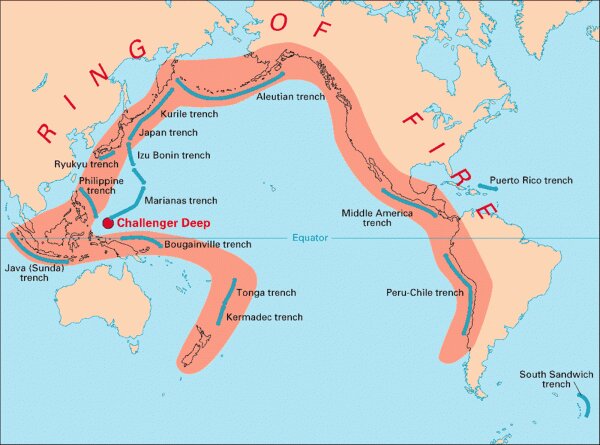 The map of the Pacific Ring of Fire. (Credit: USGS)
The map of the Pacific Ring of Fire. (Credit: USGS)







